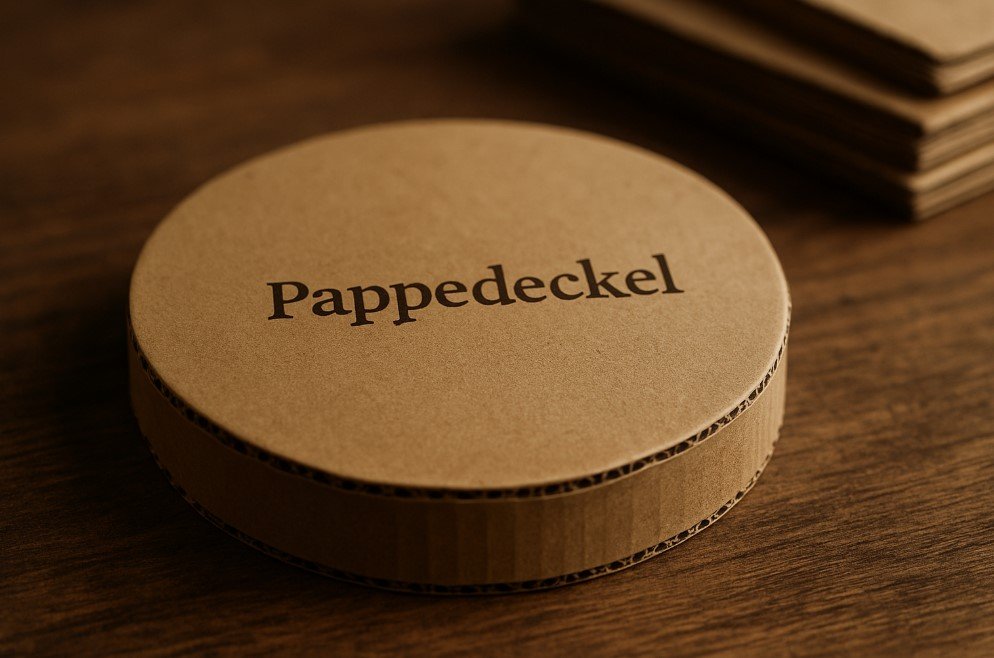Education
What Does PappeDeckel Mean in English?

PappeDeckel is a German word that can be translated into English as “cardboard lid” or “cardboard cover.” It is a compound word made by combining two separate German words: “Pappe,” which means cardboard, and “Deckel,” which means lid or cover. While the literal meaning is simple, the word can be used in different ways depending on the context, both in everyday conversation and in idiomatic expressions.
Literal Meaning of PappeDeckel
In its most direct sense, PappeDeckel describes an actual lid made from cardboard. This could be the top of a cardboard box, the cover of a disposable cup, or any other similar item made from thick paper material. In product descriptions or packaging, PappeDeckel is often used to clearly indicate the type of material and function of the lid.
For example, in a coffee shop in Germany, a disposable coffee cup with a cardboard lid might be described as having a “PappeDeckel” to distinguish it from a plastic or metal lid. In packaging industries, this term is common for labeling and product specifications.
Everyday Usage
Outside of formal product descriptions, PappeDeckel can also be used casually to refer to any type of cardboard lid people encounter in daily life. Whether it is the top of a storage box, the cover for takeaway food, or even part of a craft project, the term remains clear and practical. It is not a slang term by default, but simply a functional description.
Figurative and Idiomatic Use
While the literal meaning is straightforward, PappeDeckel can sometimes appear in informal or idiomatic expressions. In such cases, the meaning shifts away from a physical cardboard lid to a figurative use.
In casual speech, some German speakers may use “PappeDeckel” as a way to describe something that is cheap, flimsy, or not durable. The reasoning behind this is that cardboard is not as strong or long-lasting as other materials, so calling something a “PappeDeckel” can imply low quality. This use is more playful or humorous than formal, and is often understood from the context rather than from the word alone.
For example:
- “Das ist doch ein PappeDeckel!” might be said about a poorly made item. In English, this could translate to “That’s just a flimsy piece of junk!” or “That’s so cheap!”
However, it is important to note that this idiomatic use is less common than the literal one, and is not something you will find in official documents or professional writing.
Cultural Context
Germany, like many countries, places importance on recycling and sustainable packaging. Cardboard lids, or PappeDeckel, are often preferred over plastic lids because they are more environmentally friendly. This makes the term common in discussions about packaging materials, especially in businesses focusing on eco-friendly products.
When reading product descriptions or advertisements in Germany, seeing “PappeDeckel” is often a selling point, signalling to environmentally conscious customers that the packaging is recyclable and plastic-free. This aligns with broader trends in Europe toward reducing single-use plastics and increasing the use of biodegradable materials.
Translating PappeDeckel into English
When translating PappeDeckel into English, it is important to choose the right equivalent based on the context. The literal translation “cardboard lid” works well in most situations, especially for product descriptions, packaging, and everyday objects.
If the term is being used figuratively, however, a direct translation might not capture the intended meaning. In such cases, you would need to translate the implied idea rather than the exact words. For instance, if someone is calling an object a “PappeDeckel” humorously or critically, it would make more sense to use an English phrase like “flimsy piece” or “cheap thing” rather than “cardboard lid.”
Examples of Usage
Literal:
- German: “Der Karton hat einen PappeDeckel.”
- English: “The box has a cardboard lid.”
Product Description:
- German: “Kaffeebecher mit PappeDeckel, umweltfreundlich.”
- English: “Coffee cup with cardboard lid, eco-friendly.”
Figurative:
- German: “Das Auto ist ein PappeDeckel, nichts hält lange.”
- English: “That car is a piece of junk; nothing lasts.”
Why Understanding the Meaning Matters
For language learners, understanding both the literal and figurative meanings of a word like PappeDeckel is important. Knowing only the direct translation can lead to confusion when the term is used in a non-literal way. Being aware of both uses helps with better comprehension of spoken and written German.
Additionally, if you are working with packaging design, translation, or marketing in Germany, knowing exactly what PappeDeckel refers to is useful for product labelling and customer communication. Using the right term ensures clarity and avoids misunderstandings, especially in industries where material type matters to consumers.
Conclusion
PappeDeckel is a straightforward German word that means “cardboard lid” or “cardboard cover” in English. While its primary use is literal, referring to packaging or product components, it can sometimes be used informally to describe something weak or low quality. The context determines whether the meaning is literal or figurative.
In practical situations, such as packaging descriptions or eco-friendly product promotions, PappeDeckel is a positive term associated with recyclable materials. In casual conversation, however, it might take on a humorous or critical tone. Understanding both uses will help you interpret the word correctly in different settings.
Read more: Tarnplanen in German: Translation, Meaning, and Context
-

 Entertainment1 month ago
Entertainment1 month ago123Movies Alternatives: 13 Best Streaming Sites in 2026
-

 Entertainment2 months ago
Entertainment2 months ago13 Free FMovies Alternatives to Watch Movies Online in 2026
-

 Entertainment1 month ago
Entertainment1 month ago13 Flixtor Alternatives to Stream Free Movies [2026]
-

 Entertainment1 month ago
Entertainment1 month agoGoMovies is Down? Here are the 11 Best Alternatives






